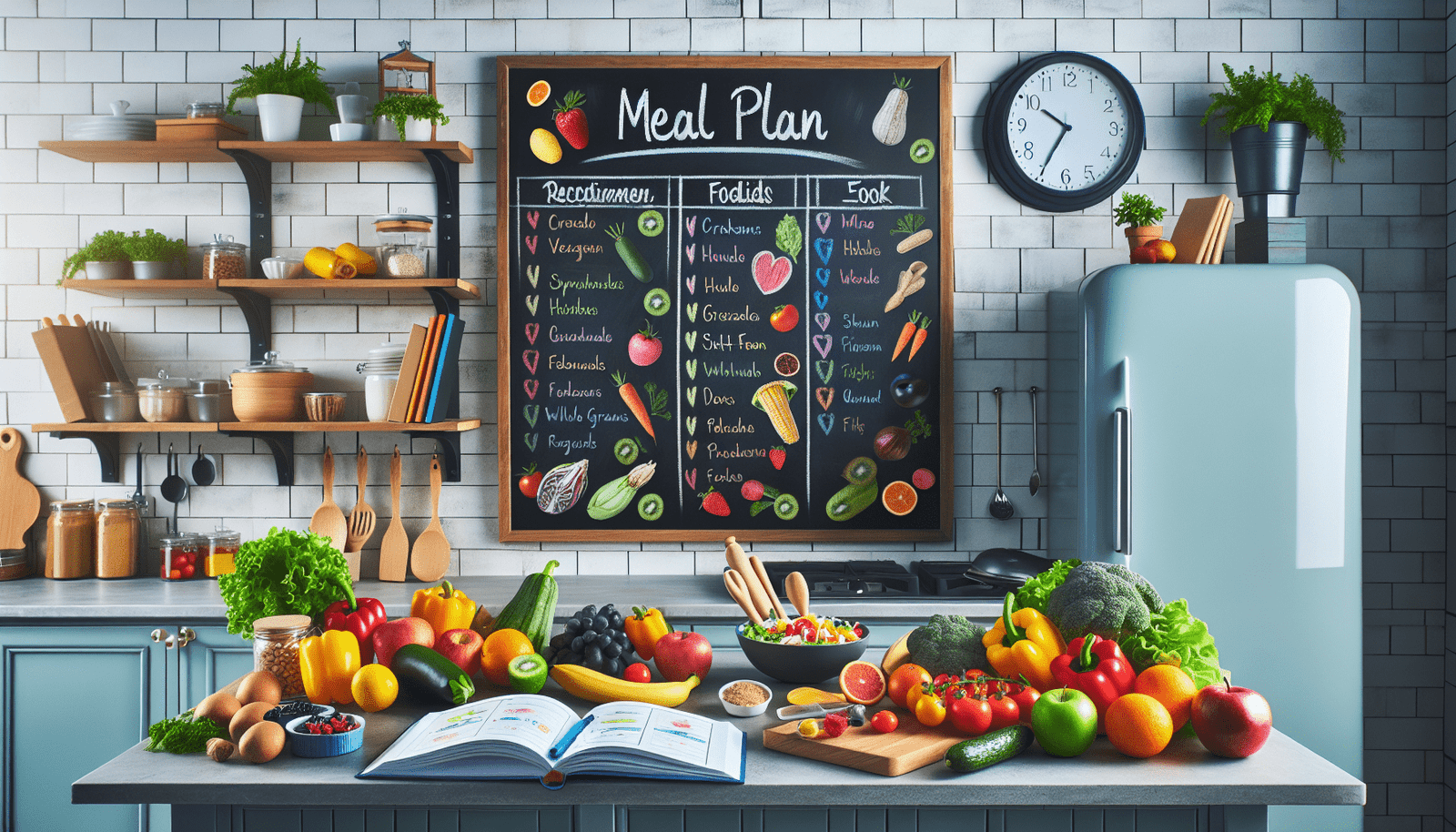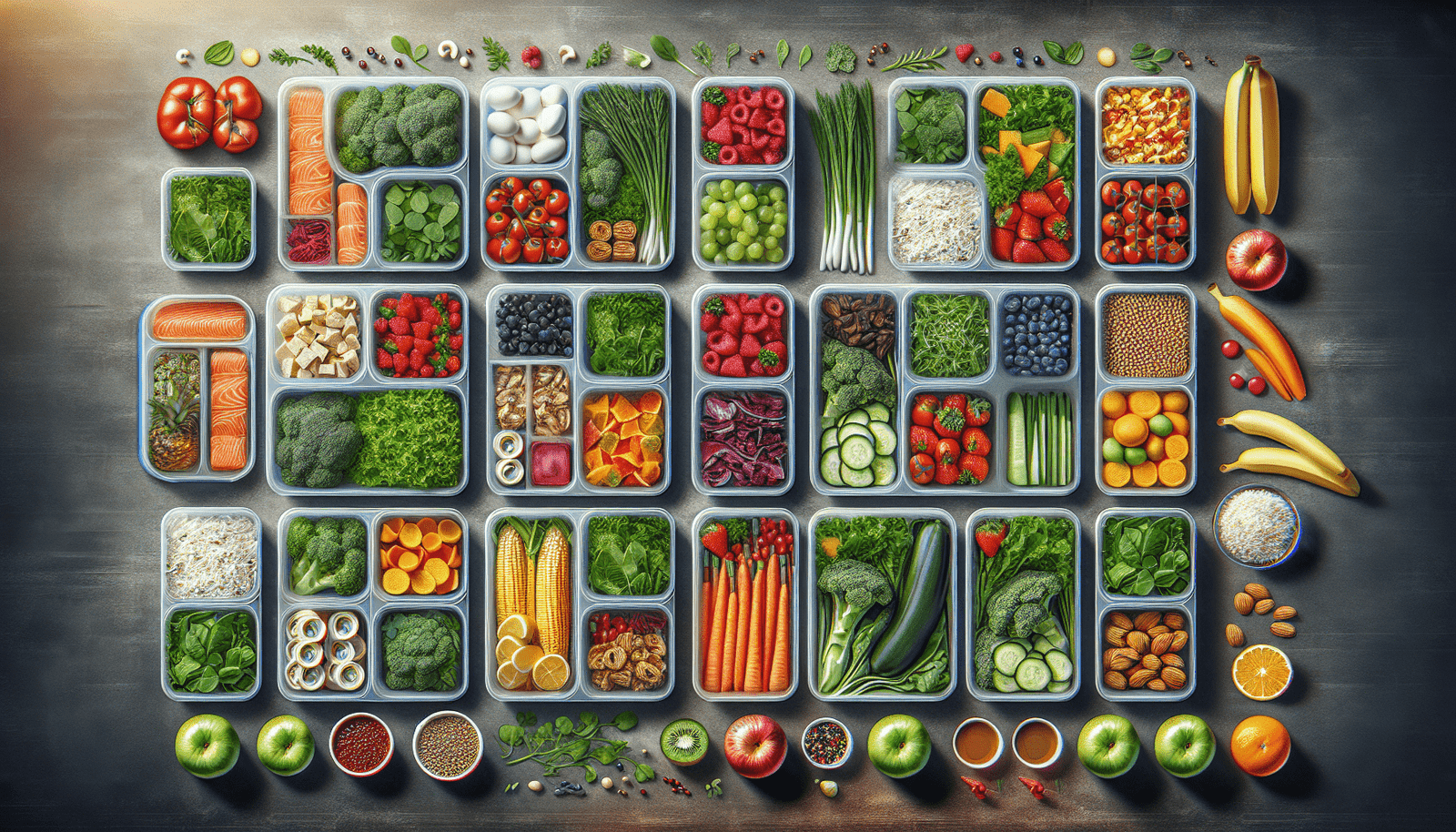If you’re tired of the never-ending struggle of deciding what to cook every day, “Weekly Meal Plans” is here to rescue you. This article will be your go-to guide for creating delicious and effortless meals for the entire week. Whether you’re a busy professional, a parent with little time on your hands, or simply someone looking to simplify your life, our weekly meal plans will provide you with mouthwatering recipes, time-saving tips, and a stress-free approach to meal preparation. Get ready to say goodbye to the dinner-time guessing game and hello to a week filled with tasty and wholesome dishes.
Importance of Weekly Meal Plans
Creating a weekly meal plan is a valuable and effective way to simplify your life and improve your overall well-being. By taking the time each week to plan out your meals, you can experience a multitude of benefits that will positively impact your health, save you time, and reduce stress. Let’s explore some of the key reasons why weekly meal plans are so important.
Saves time
One of the major advantages of weekly meal planning is the time it saves you in the long run. By knowing exactly what you are going to eat each day, you can eliminate the daily struggles of deciding what to cook for breakfast, lunch, and dinner. With a pre-determined meal plan, you can streamline your grocery shopping, food preparation, and cooking process. This allows you to spend less time wandering aimlessly in the grocery store and more time enjoying other activities that you love.
Promotes healthier eating
Another significant benefit of weekly meal planning is that it promotes healthier eating habits. When you plan your meals in advance, you have the opportunity to carefully consider the nutritional value of each dish. With a well-balanced meal plan, you can ensure that you are incorporating a variety of fruits, vegetables, whole grains, and lean proteins into your diet. This can help you stay on track with your health and wellness goals and prevent you from relying on unhealthy convenience foods or takeout.
Reduces stress
Weekly meal planning also has a positive impact on your mental well-being by reducing stress. By eliminating the daily decision-making process of what to cook, you can alleviate the stress and anxiety that often accompanies mealtime. With a clear plan in place, you can approach each mealtime with confidence and peace of mind, knowing that you have already made thoughtful choices about your food. This can help you feel more in control, reduce decision fatigue, and create a more relaxed and enjoyable dining experience.
How to Create a Weekly Meal Plan
Now that you understand the benefits of weekly meal planning, let’s dive into the process of how to create your own plan. By following these simple steps, you can develop a well-organized meal plan that suits your needs and preferences.
Set your goals
Before you start planning your meals, it’s important to set clear goals for yourself. Consider what you hope to achieve with your meal plan, whether it’s eating healthier, saving money, or trying new recipes. Write down your goals and keep them in mind throughout the planning process to help guide your decisions.
Take inventory of your pantry and fridge
The next step is to assess what ingredients you already have on hand. Take a thorough inventory of your pantry and fridge to see what items you need to use up before they expire. This will not only help you reduce food waste but also give you a better idea of what meals you can create with the ingredients you already have.
Plan your meals around sales and specials
To save money on your grocery bill, plan your meals around sales and specials at your local grocery store. Check the weekly ads or websites of your favorite grocery stores to see which items are on sale. By incorporating these discounted ingredients into your meal plan, you can stretch your budget and still enjoy delicious and nutritious meals.
Consider the dietary needs of your household
When creating your meal plan, it’s crucial to consider the dietary needs and preferences of everyone in your household. Take into account any allergies, dietary restrictions, or food preferences that may impact your meal choices. By ensuring that everyone’s needs are met, you can create a meal plan that is enjoyable for the whole family.
Create a shopping list
Once you have determined your meals for the week, it’s time to create a detailed shopping list. Refer to your meal plan and make a list of all the ingredients you will need. Don’t forget to check your pantry and fridge inventory to avoid purchasing items you already have. Having a clear shopping list will not only ensure that you have all the necessary ingredients but also prevent you from making impulsive purchases.

Meal Prep Tips
In addition to creating a meal plan, implementing effective meal prep strategies can greatly enhance your weekly routine. Consider these helpful tips to make your meal prep process more efficient and enjoyable.
Prep ingredients in advance
Spend some time on your meal prep day to prepare ingredients in advance. Chop vegetables, cook grains or proteins, and measure out spices and seasonings. By doing this prep work ahead of time, you can significantly cut down on your cooking time during the week and make meal preparation a breeze.
Batch cook
Batch cooking is a meal prep technique that involves preparing large quantities of a particular dish or ingredient to be enjoyed throughout the week. For example, you can make a big batch of soup, chili, or roasted vegetables and portion them into individual containers or freezer bags. This allows you to have ready-to-eat meals or components that can be easily incorporated into different dishes, saving you time and effort.
Invest in quality storage containers
Investing in high-quality storage containers is essential for keeping your prepped meals fresh and safe. Look for containers that are durable, leak-proof, and stackable. Glass containers are a great option as they are safe for reheating, easy to clean, and do not retain odors. Having reliable storage containers will make it easier to organize and store your meals for the week.
Label and organize your meals
To stay organized and avoid confusion, label your meal containers with the name of the dish and the date it was prepared. This will help you keep track of how long each meal has been stored and ensure that you consume your meals in a timely manner. Additionally, consider organizing your meals in the fridge or freezer by day or category to make mealtime more convenient.
Use time-saving kitchen gadgets
Take advantage of time-saving kitchen gadgets to simplify your meal prep process. Tools like slow cookers, instant pots, food processors, and mandolins can help you chop, cook, and prepare ingredients more efficiently. These gadgets can be a valuable addition to your kitchen arsenal and make the meal prep experience more enjoyable.
Sample Weekly Meal Plan
To provide you with a practical example of a weekly meal plan, here is a sample plan that incorporates a variety of delicious and nutritious meals:
Monday:
- Breakfast – Omelette
- Lunch – Greek salad
- Dinner – Baked salmon with roasted vegetables
Tuesday:
- Breakfast – Smoothie bowl
- Lunch – Quinoa salad
- Dinner – Chicken stir-fry
Wednesday:
- Breakfast – Overnight oats
- Lunch – Lentil soup
- Dinner – Beef tacos
Thursday:
- Breakfast – Avocado toast
- Lunch – Caprese salad
- Dinner – Spaghetti Bolognese
Friday:
- Breakfast – Pancakes
- Lunch – Chicken Caesar wrap
- Dinner – Vegetable curry
Saturday:
- Breakfast – Scrambled eggs
- Lunch – Greek wrap
- Dinner – Grilled steak with sweet potato fries
Sunday:
- Breakfast – Breakfast burrito
- Lunch – Cobb salad
- Dinner – Baked chicken with quinoa and broccoli
Feel free to modify this plan to suit your needs and preferences. Remember, the goal is to create a meal plan that is tailored to you and your household.

Benefits of Following a Weekly Meal Plan
By sticking to a weekly meal plan, you can enjoy a wide range of benefits beyond just saving time and reducing stress. Let’s explore some of the additional advantages that come with implementing a meal planning routine.
Saves money
Following a weekly meal plan can help you save a considerable amount of money. When you have a clear plan in place, you are less likely to make impulse purchases or eat out frequently, both of which can quickly add up. By only purchasing what you need and utilizing ingredients you already have, you can optimize your grocery budget and reduce overall food expenses.
Reduces food waste
Meal planning also helps minimize food waste, which is not only good for the environment but also for your wallet. When you plan your meals in advance, you can make sure to use up all the ingredients you purchase, reducing the likelihood of them spoiling and ending up in the trash. By being mindful of expiration dates and incorporating leftovers into future meals, you can greatly reduce your food waste and contribute to a more sustainable lifestyle.
Allows for variety
One of the great benefits of following a weekly meal plan is that it allows for variety in your diet. When you take the time to plan out your meals, you can include a diverse range of flavors, cuisines, and ingredients. This variety not only keeps your taste buds satisfied but also ensures that you are receiving a balanced mix of nutrients, vitamins, and minerals from different food sources.
Helps with portion control
Portion control is a key component of a healthy and balanced diet. By planning your meals in advance, you have the opportunity to portion out your meals according to your individual needs and goals. This can help prevent overeating and promote healthier eating habits overall. Knowing exactly what you will be eating can also assist in mindful eating, where you focus on savoring each bite and eating intuitively.
Encourages family mealtime
Following a weekly meal plan contributes to a more organized and structured mealtime routine. By knowing what meals are on the schedule, you can coordinate family members’ schedules and ensure that everyone can come together for meals. Family mealtime provides a valuable opportunity to connect, share experiences, and create cherished memories. It allows for open communication, strengthens relationships, and promotes a sense of unity within the household.
Tips for Sticking to a Weekly Meal Plan
While meal planning can be incredibly beneficial, it may require some effort and commitment to effectively incorporate into your lifestyle. Here are some helpful tips for staying on track and sticking to your weekly meal plan:
Be flexible
Remember that life is unpredictable, and it’s important to be flexible with your meal plan. Unexpected events and last-minute changes may occur, and it’s okay to deviate from your plan occasionally. Embrace the moments of spontaneity and adapt your meal plan accordingly. The key is to not let setbacks deter you from the overall habit of weekly meal planning.
Prepare meals in advance
Meal prepping is a great strategy to ensure that you always have ready-to-eat meals on hand. Take advantage of your designated meal prep day to cook and portion out your meals for the week. By having pre-prepared meals, you can easily grab and heat them up when you’re short on time or simply not in the mood to cook.
Have backup options
Even with a well-planned meal schedule, there may be times when unforeseen circumstances prevent you from following your plan. It’s always a good idea to have backup options in your pantry or freezer. Stock up on quick and easy meals like frozen vegetables, canned soups, or pre-cooked proteins so that you have a fallback plan when needed.
Stay motivated
Maintaining motivation is crucial when it comes to sticking to any routine or habit. Find motivation by reminding yourself of the benefits of weekly meal planning, such as saving time, money, and promoting a healthier lifestyle. Keep a positive mindset and celebrate small victories along the way. Consider sharing your meal planning journey with a friend or family member to stay accountable and motivated together.
Reward yourself
Rewarding yourself for successfully sticking to your meal plan can help maintain your motivation and make the process more enjoyable. Treat yourself to small rewards for accomplishing your meal planning goals, such as trying a new recipe, enjoying a special meal out, or investing in a new kitchen gadget. Celebrating your achievements will reinforce positive habits and make you more likely to continue with your weekly meal planning routine.

Common Meal Planning Mistakes to Avoid
As with any new endeavor, there are common mistakes that can arise when creating a weekly meal plan. By being aware of these potential pitfalls, you can avoid them and ensure a successful and sustainable meal planning experience. Here are some common meal planning mistakes to stay away from:
Not considering individual preferences
When planning your meals, it’s essential to take into account the individual preferences of everyone in your household. Failing to consider these preferences can lead to dissatisfaction with the meal choices and ultimately result in a lack of adherence to the plan. Take the time to discuss and incorporate everyone’s likes and dislikes into the meal plan to ensure a more enjoyable and successful experience.
Overcomplicating recipes
While trying new and exciting recipes can be fun, it’s important not to overcomplicate your meal plan. Choose recipes that are within your skill level and use familiar ingredients. Trying to tackle complicated and time-consuming recipes may lead to frustration and abandonment of the plan. Start with simple, flavorful dishes and gradually incorporate more complex recipes as you become more confident in your culinary abilities.
Ignoring expiration dates
When meal planning, it’s crucial to pay attention to expiration dates on perishable items. Failing to do so can lead to food waste and spoilage. Check the expiry dates of ingredients in your pantry, fridge, and freezer, and plan your meals accordingly. Utilize ingredients that are closer to their expiration date earlier in the week to prevent them from going to waste.
Not using leftovers
Leftovers are a valuable asset to have when meal planning, as they can provide easy, ready-to-eat meals for the following days. Avoid the misconception that leftovers are boring or repetitive. Get creative with repurposing leftovers into new dishes or incorporating them into salads, wraps, or sandwiches. This not only reduces food waste but also adds versatility to your meal plan.
Not adjusting for unexpected events
Life is full of unexpected events and last-minute changes, so it’s important to remain adaptable with your meal plan. If an unexpected dinner invitation arises or you simply don’t feel like cooking one night, don’t let it derail your entire plan. Instead, shift meals around or freeze any perishable ingredients for future use. Planning for unexpected events will help you navigate these situations without feeling overwhelmed or defeated.
Resources for Weekly Meal Plans
If you’re looking for additional support or inspiration for your weekly meal plans, there are numerous resources available that can help you along your journey. Consider utilizing the following resources:
Online recipe websites
Online recipe websites, such as AllRecipes, Food Network, and Cooking Light, offer a vast collection of recipes for every meal and dietary preference. These sites often provide filters and search options, allowing you to specify ingredients, cooking time, and dietary restrictions.
Meal planning apps
Meal planning apps like Mealime, Plan to Eat, and Paprika offer convenient ways to organize, plan, and create shopping lists for your meals. These apps often provide features like automatic recipe scaling, smart grocery lists, and customization options to suit your preferences and needs.
Cookbooks
Cookbooks provide a wealth of inspiration and guidance for meal planning. Explore a variety of cookbooks that align with your dietary preferences or focus on specific cuisines or health goals. From beginner-friendly cookbooks to chef-inspired creations, there is a cookbook out there to suit every level of expertise and taste.
Nutritionist consultations
If you’re looking for personalized guidance and expert advice, consider consulting with a nutritionist. A nutritionist can help you develop a meal plan that meets your specific dietary needs, addresses any health concerns, and guides you towards healthier eating habits. They can provide valuable insights, recommendations, and support throughout your meal planning journey.
Social media communities
Engaging with social media communities focused on meal planning and healthy eating can provide a sense of community and share tips and inspiration. Platforms like Instagram, Facebook groups, and Pinterest are home to a plethora of individuals and organizations dedicated to sharing meal ideas, recipes, and strategies for weekly meal planning.

FAQs about Weekly Meal Plans
As you venture into the world of weekly meal planning, you may have questions or concerns. Here are answers to some frequently asked questions about meal planning:
How do I come up with meal ideas?
Coming up with meal ideas can be challenging, especially if you’re not familiar with cooking or have limited experience with certain ingredients. To spark inspiration, explore websites, cookbooks, or social media for recipe ideas. Consider your dietary preferences, cultural influences, and any specific ingredients you want to incorporate. Experiment with new flavors and textures to keep your meals exciting and diverse.
What if I don’t have time to meal prep?
If you find yourself short on time for meal prep, try to find small pockets of time throughout the week to complete smaller prep tasks. For example, chop vegetables the night before or marinate proteins in advance. Alternatively, focus on quick and easy recipes that require minimal preparation. Additionally, consider utilizing time-saving kitchen gadgets, meal prep services, or pre-cut and pre-packaged ingredients to simplify the process.
How can I accommodate dietary restrictions?
Accommodating dietary restrictions is an important aspect of meal planning. Start by identifying any specific dietary needs or restrictions within your household. Research recipes and resources focused on those dietary restrictions, such as vegetarian, vegan, gluten-free, or dairy-free options. Adapt existing recipes to meet specific requirements or seek out specialized cookbooks or online communities dedicated to those dietary restrictions for inspiration.
Can I still eat out while following a meal plan?
Absolutely! Incorporating occasional meals out into your meal plan is completely feasible. Determine how often you would like to eat out and plan your other meals accordingly. Depending on your goals and lifestyle, you may choose to have a designated “cheat day” or allocate a certain number of meals per week for dining out. Be mindful of your choices and strive to make healthier selections when eating out.
What if I don’t like cooking?
Even if you don’t particularly enjoy cooking, you can still create a successful meal plan. Start with simple and quick recipes that require minimal cooking time. Consider utilizing pre-cooked or ready-to-eat options, such as rotisserie chicken, canned beans, or pre-packaged salads. Additionally, explore meal prep services or frozen meal options that can provide you with nutritious meals without the need for extensive cooking.
Conclusion
The importance of weekly meal planning cannot be overstated. By dedicating a little time each week to plan and prepare your meals, you can reap a wide range of benefits. From saving time and money to promoting healthier eating habits and reducing stress, weekly meal plans provide a practical and beneficial tool for individuals and families alike. By following the suggested steps, implementing meal prep techniques, and staying motivated, you can enjoy the advantages of a well-organized meal plan. Embrace the variety, flexibility, and convenience that meal planning offers, and savor the joy of nourishing yourself and your loved ones with delicious and nutritious meals. Start your meal planning journey today and discover a world of culinary possibilities!


